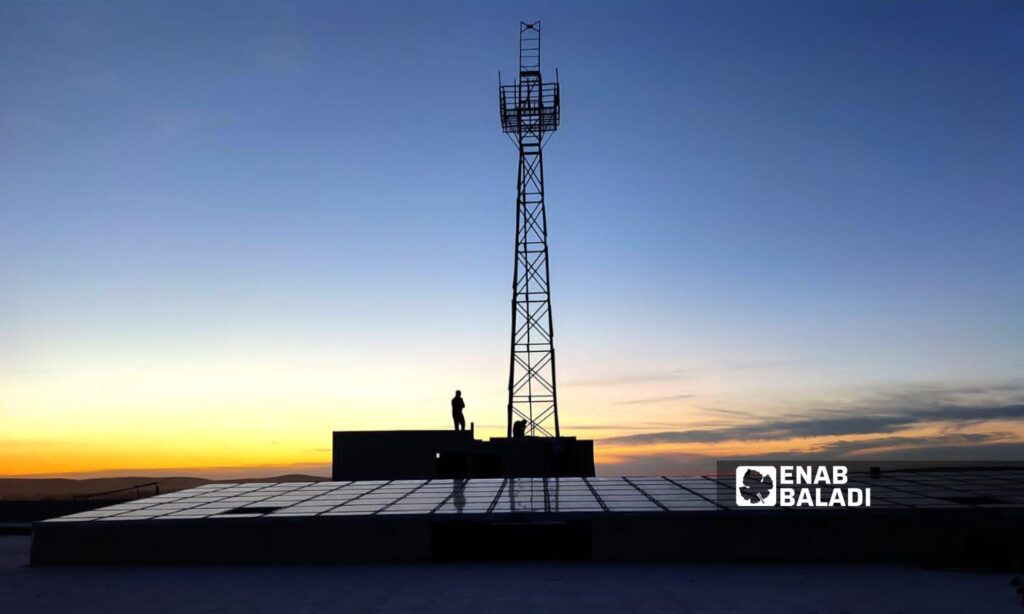Users of internet networks in the city of al-Dana in northern Idlib are suffering from weak connectivity and frequent outages, which hinders their communication and negatively affects their work during meetings, workshops, and remote learning.
The issue of disconnection and weak audio-visual synchronization during video calls is apparent, forcing participants to rely on listening without using their cameras, which negatively impacts the quality of communication.
Poor service at high prices
Mustafa Khaled, a mobile phone shop owner in the city, complained about the repeated disconnection and weakness of the internet, which has adversely affected his ability to serve customers and maintain phone systems that require a stable internet connection.
Khaled pays $25 per month for an internet line with a speed of 10 megabits per second, considering this to be a high cost for a service that is not good. He pointed out that the actual speed does not exceed 8 megabits.
The situation worsens during power outages in the city, as there is no alternative solution available for network providers, not even batteries to power the internet. Khaled has a router connected to a battery, but the network owner does not have batteries to keep the network running during power cuts.
Khaled noted that he has made numerous complaints to network providers, but there have been no effective solutions or changes to the poor network conditions that have persisted for about a year.
Young woman Fatima Mohammed from al-Dana said to Enab Baladi that she pays $10 (about 350 Turkish lira) for a monthly subscription for internet with a speed of 1 megabit, considering the price to be high for the service, especially compared to wages and salaries, as she works as a nurse in one of the clinics.
Mohammed mentioned that she has lodged several complaints with the network owner about the poor service, and the constant response has been that it is “general weakness” or that the issue stems from weak internet sources in Turkey. She even switched networks but found no difference.
On his part, university student Ahmed Mustafa said that the cost of internet subscription adds to the financial burden of studying. He added that he needs internet for his studies and work, as he relies on it continuously for long periods.
Prices are very high compared to the income level in the area, where daily wages do not exceed 100 Turkish lira (three dollars).
Power outages affect the delivery of high-quality internet to users in the city of al-Dana, northern Idlib – October 13, 2024 (Enab Baladi/Mohamed Masto)
What are the reasons?
Ahmed al-Omar, the owner of an internet network in al-Dana, told Enab Baladi that factors contributing to poor internet service include customers subscribing to limited speeds that do not meet their needs, as well as issues related to routers and cables.
He mentioned that most customers subscribe to packages that are insufficient in terms of internet speed, such as 1 megabit, which leads to poor service.
He added that the router plays a role in signal weakness, and the continuous power outages directly affect internet quality.
According to al-Omar, prices vary due to the depreciation of the Turkish lira against the US dollar, noting that network owners have set the prices of packages in dollars to stabilize the pricing.
He added that the network receives complaints through an office number, where communication with the customer takes place to evaluate the actual speed.
If the issue is in speed, it is increased to ensure performance; if the reason is not speed, a maintenance team is sent to investigate any other problems.
Users of internet networks in the city of al-Dana, northern Idlib are complaining about weak network connectivity – October 13, 2024 (Enab Baladi/Mohamed Masto)
Internet networks in northern Syria rely on external sources, based on importing services through cables from Turkey, due to the lack of sufficient local infrastructure.
Internet subscriptions in northern Syria vary according to speed and cost, and networks often offer limited-speed packages, starting from 1 megabit per second and reaching 10 megabits or more.
Internet networks and their operators suffered damages and losses due to the earthquake in February 2023, just like many facilities across different sectors.
In May, the Syrian Salvation Government (SSG) operating in Idlib announced the start of accepting applications for licenses to practice internet trading, within a period of five days.
The license serves as legal permission to engage in the internet trade profession and is granted according to laws and regulations in place by the Salvation Government.
The Public Telecommunication Corporation (PTC) oversees the telecommunications sector in Idlib and periodically announces maintenance for lines, installation of new lines, and expansion of the network.











